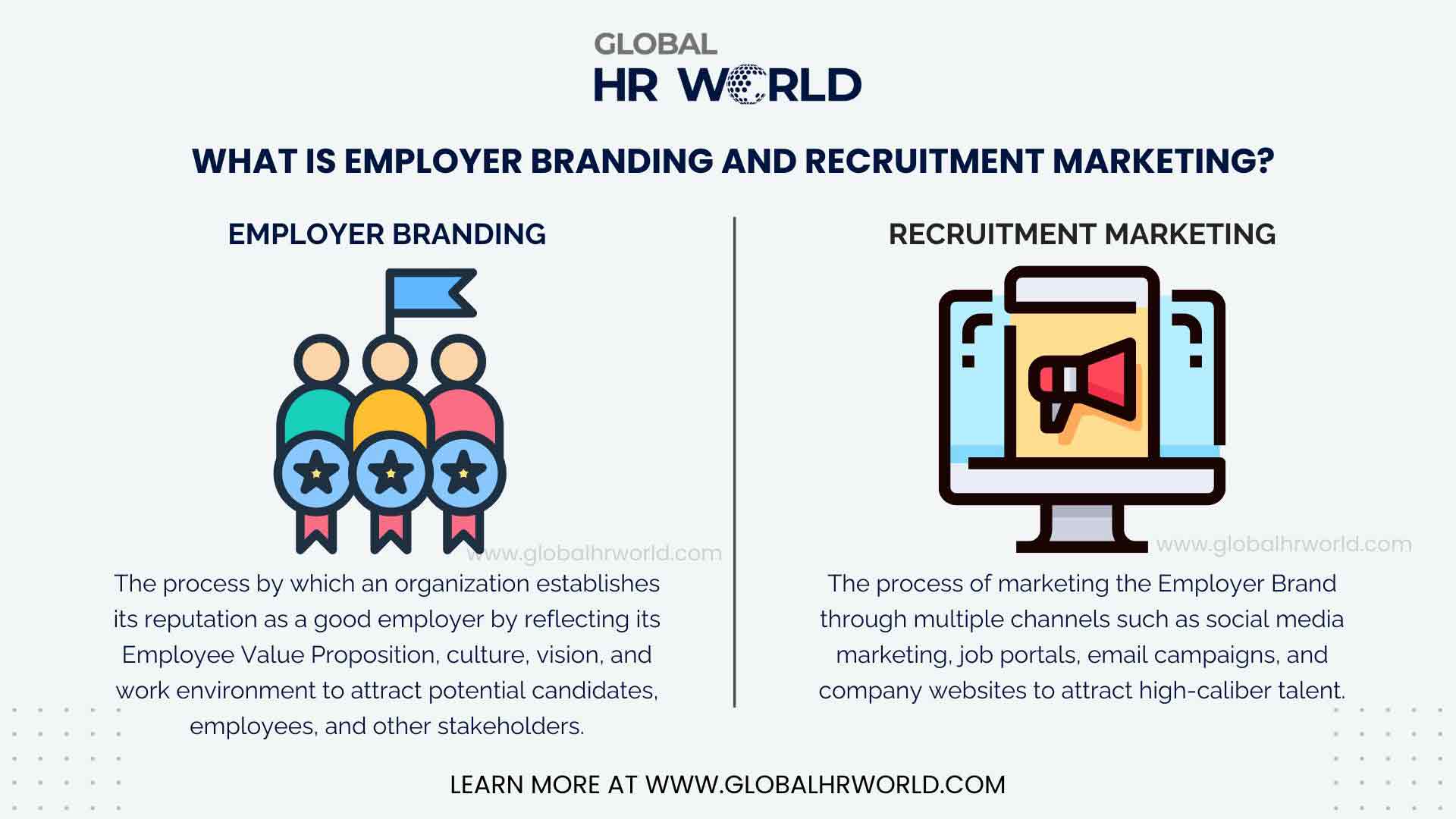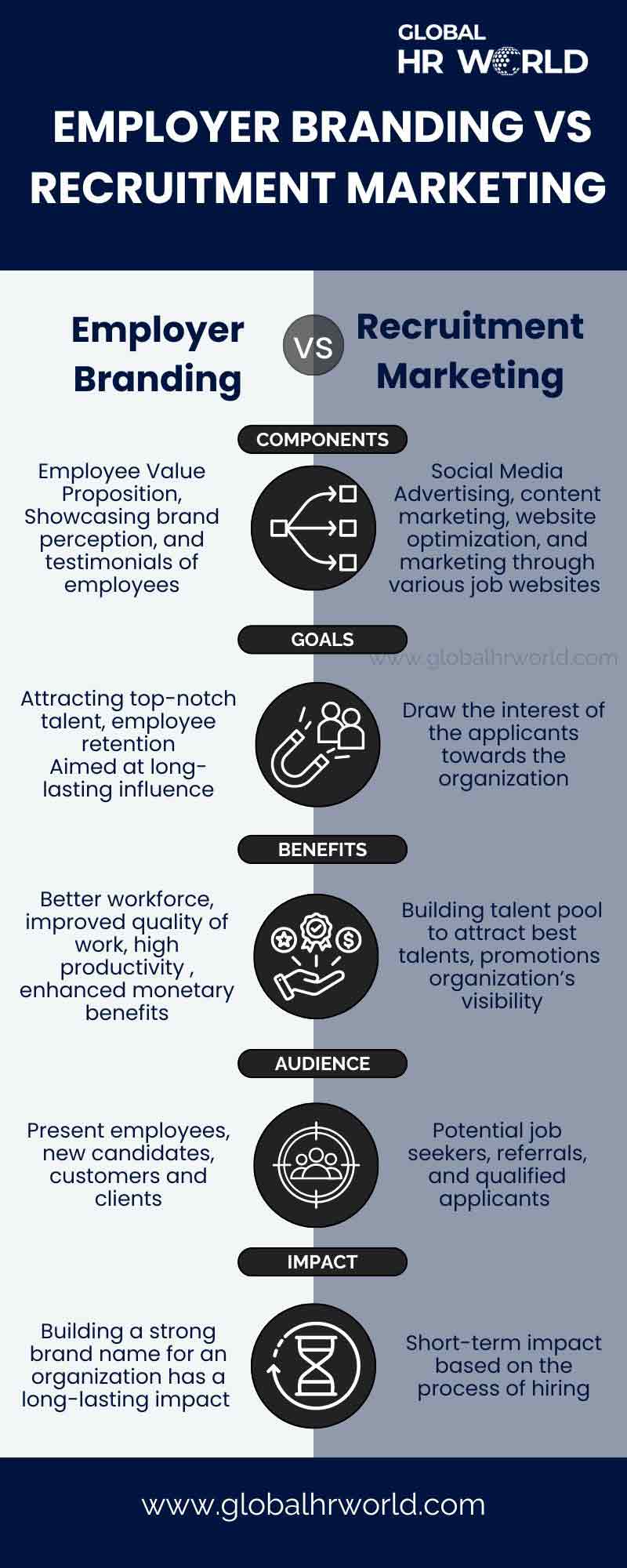The difference between employer branding and recruitment marketing must be understood as they play a pivotal role in establishing the organization’s position in today’s competitive world. Both employer branding and Recruitment Marketing aim to strengthen the role of the organization in the job market. While these terms appear similar and converge in some aspects, there are significant differences between employer branding and recruitment marketing. The caliber article defines employer branding and recruitment marketing and discusses the differences in detail.
Defining Employer Branding and Recruitment Marketing
Employer Branding is defined as the process by which an organization establishes its reputation as a good employer by reflecting its Employee Value Proposition, culture, vision, and work environment to attract potential candidates, employees, and other stakeholders. It reflects to the job seekers the factors that make the organization a unique and desirable place to work by providing compelling justifications for working with them. According to a survey conducted by Glassdoor, it was revealed that ‘75% of the active job seekers are likely to apply for a job if the employer actively manages its employer brand’.

Recruitment Marketing, on the other hand, involves ‘the strategies and tactics used to attract and engage potential candidates during the hiring process.’ It involves marketing the Employer Brand through multiple channels such as social media marketing, job portals, email campaigns, and company websites to attract high-caliber talent. In a Statistical report by LinkedIn for Small to Medium Businesses, it was found that ‘52% of candidates first seek out 1) the company’s websites and 2) social media to learn about an employer’. An efficient Recruitment Marketing strategy is therefore a crucial aspect of talent acquisition in an organization.
Understanding the difference between Employer Branding and Recruitment Marketing
Employer Branding and Recruitment Marketing are two essential components that contribute to the holistic growth of an organization. For the effective functioning of the organization, involving retention and attraction, maintaining consistency and engagement, it is necessary to implement both of them. Due to the significant correlation between the concepts, they are often used interchangeably, making it critical to understand the difference between employer branding and recruitment marketing. Here are some of the major differences between employer branding and recruitment marketing.
Difference between Employer Branding and Recruitment Marketing: #1 Components
While employer branding aims to highlight the credibility and prestige of an organization to prospective employees, present jobholders, clients, and customers, recruitment marketing incorporates strategies for attracting new talent. In that sense, recruitment marketing can be regarded as one major component of employer branding. Other components of employer branding are Employer Value Proposition; the testament including the values, benefits, support, and company culture given by the company to its employees, showcasing the brand perception, and testimonials of employees about the working environment.
The study on LinkedIn found that ‘candidates trust the company’s employees 3x more than the company to provide credible information on what it’s like to work there.’ Recruitment Marketing includes the components of social media advertising, content marketing, website optimization, and marketing through various job websites.
Difference between Employer Branding and Recruitment Marketing: #2 Goals
The major goal of both employer branding and recruitment marketing is to present the organization as a desirable employer. However, there are some key distinctions between the two in terms of goals. Along with attracting top-notch talent, employee retention is one significant goal of Employer branding. ‘Employer branding can lead to a 28% increase in retention rates’ as per the statistical report by LinkedIn. Meanwhile, recruitment marketing aims to solely draw the interest of job applicants towards the organization. Therefore, employer branding is aimed at long-lasting influence and is constant while recruitment marketing focuses on immediate hiring needs which changes and evolves.
Difference between Employer Branding and Recruitment Marketing: #3 Benefits
The most crucial benefit of both employer branding and recruitment marketing is attracting top talent. The benefits of employer branding include a better workforce, improved quality of work due to positive organizational culture, high productivity resulting in less frequent hiring, and enhanced monetary benefits. Recruitment Marketing benefits the organization by building a talent pool to attract the best candidates. Furthermore, recruitment marketing through its constant promotions in the job market increases the visibility of the organization by managing the organization’s role in employer review sites like LinkedIn, Glassdoor, and Indeed. An important benefit of recruitment marketing is that it nurtures better relationships with even passive job seekers creating in them an urge to join the organization.
Difference between Employer Branding and Recruitment Marketing: #4 Audience
The difference between employer branding and recruitment marketing is evident in terms of the audience to whom these are targeted. Employer branding which focuses on the reputation and work culture of the organization influences the present employees as well as new candidates. It also informs the customers and clients about the quality of work in the organization. Nevertheless, recruitment marketing is targeted at potential job seekers, referrals, and qualified applicants to the current job openings in the organization.
As the majority of the applicants are users of social media, the advertisements through these platforms attract these audiences. According to Statista, ‘As of January 2023, Facebook was the most commonly used social media platform among marketers worldwide’ as it is the most widely used social network.
Difference between Employer Branding and Recruitment Marketing: #5 Impact
Time duration is an important factor in determining the difference between employer branding and recruitment marketing. Employer Branding that focuses on building a strong brand name for an organization has a long-lasting impact while recruitment marketing aiming to attract candidates has a short-term impact based on the process of hiring. The stronger the impact of the employer branding, the less emphasis the organization must place on recruitment marketing. The statistical study on LinkedIn further concluded that ‘great employer brand makes it easier to recruit’ and with employer branding ‘50% more qualified applicants’ applied to organizations.
Conclusion
Employer Branding and Recruitment Marketing are two interrelated concepts that play a significant role in the growth and development of an organization. Employer branding refers to the process in which an organization showcases its reputation while Recruitment Marketing is the strategies and tactics used by the organization to market itself before prospective employees. There are certain differences between employer branding and recruitment marketing in terms of the components of both, such as Employee Value Proposition, brand perception, and testimonials by employees in the case of employer branding and social media advertising, content marketing, website optimization, and job website marketing for recruitment marketing.
The goals of both also differ in that recruitment marketing solely focuses on attracting job seekers, but employer branding aims at employee retention along with drawing the attention of new talent. Regarding the differences in benefits, employer branding provides a better workforce, improved quality of work, and high productivity leading to less frequent hiring, and improved monetary benefits, and recruitment marketing improves the visibility of the organization. The audience and impact also vary in both of these, that is employer branding has a long-lasting impact, and recruitment marketing has a short-term impact, especially in the hiring process. For the effective operation of an organization, it is essential to comprehend the difference between employer branding and recruitment marketing.
Infographic

Knowledge Check!
Frequently Asked Questions (FAQs)
What is Recruitment Marketing?
Recruitment Marketing is the strategies and tactics to market an organization through multiple channels such as social media marketing, job portals, email campaigns, and company websites to attract high-caliber talent.
What is the difference between Employer Branding and Recruitment Marketing?
There are certain differences between employer branding and recruitment marketing in terms of the components of both, such as Employee Value Proposition, brand perception, and testimonials by employees in the case of employer branding and social media advertising, content marketing, website optimization, and job website marketing for recruitment marketing.
The goals of both also differ in that recruitment marketing solely focuses on attracting job seekers, but employer branding aims at employee retention along with drawing the attention of new talent. Regarding the differences in benefits, employer branding provides a better workforce, improved quality of work, and high productivity leading to less frequent hiring, and improved monetary benefits, and recruitment marketing improves the visibility of the organization. The audience and impact also vary in both of these, that is employer branding has a long-lasting impact, and recruitment marketing has a short-term impact, especially in the hiring process



